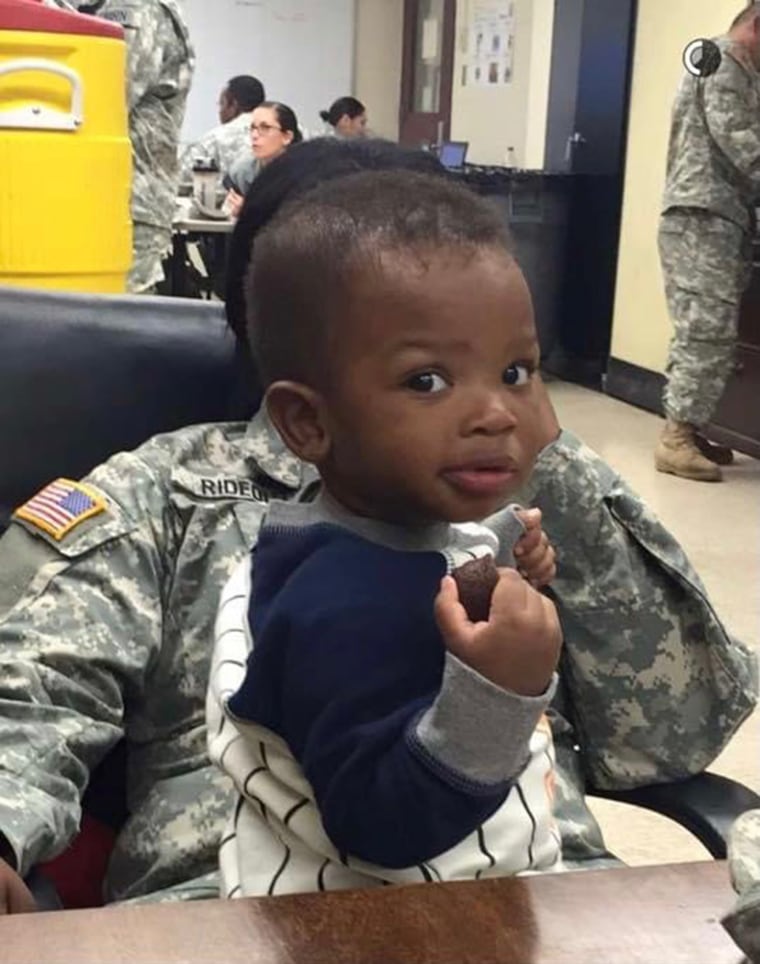This story discusses suicide. If you or someone you know is at risk of suicide please call the U.S. National Suicide Prevention Lifeline at 800-273-8255, text HOME to 741741 or go to SpeakingOfSuicide.com/resources for additional resources.
Four years ago, Darcel Rideout reached her lowest point. She had been experiencing frequent bouts of depression and anxiety, which increased after the birth of her son. When she reached out to her superiors in the Pennsylvania National Guard for help, she said they didn’t offer much support.
“I was told ... I am a soldier and that is what I needed to focus on,” the 31-year-old from Philadelphia told TODAY. “I spoke up about it, and I was rejected.”

The Pennsylvania National Guard told TODAY that they've expanded their mental health services, growing from one person providing resources for over 14,000 service members to now six new social work positions. According to Lori Murphy, director of psychological health at the Pennsylvania National Guard, "the program’s personnel work together to perform a broad range of functions to support, guide and assist service members and their families while dispelling stigma."
At the time, Rideout said she did not experience such support and tried finding a therapist herself, but she struggled. Rideout noted that many offices did not accept her military health insurance and she faced paying high copays. As the stress mounted, she felt hopeless. Then she attempted suicide and felt unsupported by her colleagues.
“I was alone," she said.
But a suicide help line staffer offered Rideout the support that she needed. She told her that the University of Pennsylvania had the Steven A. Cohen Military Family Clinic that offered no cost behavioral health treatment for service members and their families regardless of “discharge status” or “eligibility for VA benefits.”
“I spoke with the intake representative and we began to talk about my suicidal ideation and behavior and that is when she told me I was high risk," she said. "A few minutes later a therapist was calling me, and my appointment was made the next day.”

That call changed her future and she's speaking out to encourage others to take their mental health seriously.
“It saved my life,” she said. "You can have a better quality of life, and that's what treatment is about. It's about quality of life, living and learning and loving and not having those issues with mental illness and suicidal thoughts."
Mental health in the military
Rideout is not alone. Leah Blain, a psychologist and the clinic director at the Steven A. Cohen Military Family Clinic at Penn, said that members of the military and National Guard are more likely to experience mental health conditions for a variety of reasons. The National Guard is an element of the U.S. military that serves the community and country — they respond to domestic emergencies, overseas combat missions and more. They can be called on in a moment's notice.
“They are actually at a higher risk of having experienced childhood trauma as well as experiencing trauma during their service, including things like military sexual trauma, combat exposure, accidents during training,” Blain told TODAY. “Then there's also additional components of really being separated from family members, loved ones.”
All this stress may contribute to depression, anxiety and post-traumatic stress symptoms. Yet, finding treatment can be challenging.
“There are so many barriers to seeking care for our service members,” Blain said. “Many report that they’re concerned seeking behavioral health care, in particular, could really impact their eligibility to continue to serve or for a promotion.”
Rideout agrees. She said many people she knew avoided getting help because they didn’t want to have it impact their work.
“They’re like, ‘We don’t want that on our record’ because that’s what happens when you’re diagnosed with a mental illness,” she said. “ ... There are restrictions.” According to the Department of Defense, many mental health illnesses are classified as "disqualifying conditions." Yet the National Guard spokesperson stressed that "Guardsmen do not need to fear limited careers by simply seeking psychological health support. Service members and leaders are encouraged to speak with psychological health personnel in order to maintain a high level of personal mental fitness and resiliency."

The military ethos can also contribute to people avoiding treatment sometimes. Members of the military often feel close to their peers and that can help them through tough times. But in the same sense, a focus on strength often makes people feel like they shouldn’t ask for help. A 2015 systemic review of studies found that approximately 60% of military personnel who experience mental health issues do not seek help. One of the most frequently reported barriers was stigma.
“There is that stigma about potentially showing weakness. Behavioral health is not always seen in the same light as physical health,” Blain said. “There’s this emphasis on pushing oneself beyond physical and emotional limits.”
While full-time military members benefit from having behavioral health experts on base, members of the National Guard often do not have that, Blain explained. This makes it even harder to find care.
“It's a much more complicated picture,” she said. “What we hear from a recent survey of National Guard family members it that over half said that they did not feel that civilian providers were equipped to handle their concerns. And many don't have any access to support if they can't afford the copay or the insurance.”
A path toward recovery
Rideout, who was in the National Guard for 11 years, loved learning about tactical planning, being a weapons instructor and serving during presidential inaugurations. But it felt hard when the job she enjoyed so much didn’t support her mental health. She said the meeting at the clinic “changed my life.” She started cognitive behavioral therapy and reframed how she thought about her mental health.
“I no longer suffer from anxiety. I am able to recognize the triggers. I am able to cope and I’m able to recover much more quickly than I was before I started,” she said. “Suicide is no longer an option.”
Rideout is sharing her story to help other people, especially those in the military, realize that asking for mental health help is important — and can make a huge difference.
“Mental health is not something that is mentioned. It's not something that's prioritized,” she said. “Everything we do is based on our mindset. Our thoughts influence our feelings. Our feelings influence our behavior. So, if I am not thinking about the importance of mental health, I am not going to feel that it's important."

She now works as a health care claims and benefit specialist and owns her own clothing business focused on Black culture and history and she runs a nonprofit focused on suicide awareness and prevention. She wants people to be able to get the help they need, and she hopes that the military considers adding more mental health training.
“Now, I’m living,” she said. “If I can tell my story and save one life, mission complete. If I can tell my story and save thousands of lives, that’s a bonus."
CORRECTION (November 18, 2020, 9:31 a.m. ET): An earlier version of the story incorrectly identified Rideout as a cleaning specialist.
